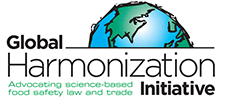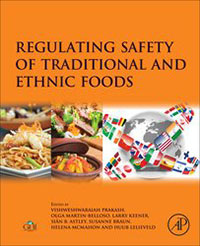GHI Food Safety Incident Report Website now available in over 30 languages!
GHI Food Safety Incident Report Website
Plan for globally safer food
Food safety is a major concern around the world. WHO estimates that each year worldwide unsafe food causes 600 million cases of foodborne diseases and 420 000 deaths of which 30% are children under 5 years of age. Food safety therefore remains a top priority for consumers and legislators. Despite the many efforts in this area, however, there are hardly formal requirements for those responsible for the design and management of food safety. To achieve higher professional and ethical standards in food safety practices, the Global Harmonization Initiative (GHI) is proposing that countries make “Food Safety Professional” a regulated profession, similar to medical or legal professions, setting formal requirements for education, registration and the establishment of professional bodies.
On 2 March 2021 the Global Harmonization Initiative (GHI), an international non-profit network of individual scientists and scientific organizations working together to promote harmonization of global food safety regulations and legislation, released a proposal for the recognition of Food Safety Professional (FSPro) as a regulated profession.
The roles and responsibilities of professionals working in the area of food safety are important to public health and safety, and these professionals have the necessary scientific qualification and knowledge to perform their duties, similarly to the medical or legal professions, where doctors, nurses and lawyers have to hold a specific degree to access the profession, and register with their professional body before being allowed to practice.
In contrast, defined registered roles in food safety management are virtually absent around the world. Many countries now have requirements in place for food producing companies to have their products covered by HACCP plans (Hazard Analysis Critical Control Points), a rigorous methodology aiming to put food safety protections in place, based on science-based risk assessments. However, there are no requirements as to who is qualified to develop and/or manage the implementation of a HACCP plan. As a result, HACCP plans are often ineffective, misguided or simply not implemented properly.
The GHI proposal aims to promote the adoption of a legislative framework for the recognition and regulation of food safety professionals around the world, including defining responsibilities, specifying education programmes and the establishment of professional bodies and registers.
Food science, including the safety aspects, is part of the curriculum of many universities and international educational programmes around the world and the GHI proposal contains a long list of relevant topics for FSPro’s, but lacking the legislative and organizational part.
Proper food safety management is also a matter of ethics. GHI has concluded that in this case ethical behaviour will require a scientifically informed awareness of what food safety is, combined with an explicitly stated commitment to always act accordingly. A combination of a specified education, a formal commitment, a professional body to oversee ongoing education and professional integrity, and a legal framework will put food safety management on a firm footing.
GHI will therefore work with our global membership to make the case for FSPro as a regulated profession around the world, for the benefit of food safety everywhere.
The proposal for Establishing of Food Safety Professional as a Regulated Profession can be downloaded from the GHI Library.

Yasmine Motarjemi vs Nestle - Declaration
GHI Consensus Document on Food Irradiation
The Global Harmonization Initiative (GHI) has released a global science-based consensus document about the application of irradiation of food. This consensus is needed because of the current confusion around safety of food that has been irradiated to prevent spoilage.
After consultation with the GHI membership, the authors (Tatiana Koutchma, Larry Keener and Heidi Kotilainen) summarised the state-of-affairs and the consensus document can be downloaded from the GHI website.
GHI recommends that international regulatory bodies accept the finding of the Joint FAO/ IAEA/ WHO Expert Committee on Food Irradiation (JECFI) first published in 1981 and adopted by the FAO/ IAEA/ WHO Joint Study Group High-Dose Irradiation in 1999.
More information about GHI and the global scientific consensus process can be found on the GHI website.
Adriana Sterian, Communications Director
Download the press release (English)
Translations:
Brazil-Portuguese
Czech
Spanish
Slovak
GLOBAL HARMONIZATION INITIATIVE UNVEILS REDESIGNED WEBSITE, LAUNCHES SOCIAL MEDIA CHANNELS
The new online platforms will help the international non-profit group better communicate the need for harmonized science-based global food safety regulations and laws
The Global Harmonization Initiative (GHI) is pleased to announce the re-launch of its new, redesigned website, along with Facebook, Twitter and LinkedIn channels. The new web portal goes live today, and is located at the same internet address, www.globalharmonization.net.
Visitors will experience a more intuitive website, with improvements to its design, content and navigation. The mobile-friendly website offers easy access to information about GHI and its working group activities, conferences and meetings, and other news and developments.
“The redesigned GHI website and the rollout of our new social media platforms will help us better communicate to our members, stakeholders in industry and government, and the public worldwide,” states Huub Lelieveld, GHI president. “We are pleased to have a more robust and dynamic online presence that will enable GHI to share objective, science-based evidence supporting the global harmonization of food safety laws and regulation.”
GHI’s new social media sites are now live. The launch of these sites builds the association’s online presence beyond its website, allowing for increased communication with stakeholders and interaction among members and the scientific community. Members and the public can find GHI on the following social networking sites:
Facebook: www.facebook.com/GHI4FoodSafety
Twitter: @GHI4FoodSafety
LinkedIn: www.linkedin.com/company/global-harmonization-initiative
TRADITIONAL AND ETHNIC FOODS: APPLYING MODERN FOOD SAFETY APPROACHES TO OLD-WORLD CUISINE
A new book explores how to retain the cultural and nutritive value of these foods while ensuring safety through globally harmonized regulations
Many traditional foods provide excellent nutrition from sustainable resources, with some containing nutraceutical properties that make them not only a source of cultural and traditional value, but also valuable options for addressing the growing need for food resources. There are, however, instances in which the processing or consumption of traditional foods may introduce foodborne illness hazards.
Published in December 2015, Regulating Safety of Traditional and Ethnic Foods, addresses the need for balance in safety regulation and retaining traditional food options. The book, the second in the Global Harmonization Initiative (GHI) series, is edited by GHI members and officers V. Prakash, Olga Martin-Belloso, Larry Keener, Sian B. Astley, Susanne Braun, Helena McMahon and Huub Lelieveld.
Written by a team of experts in food safety, nutrition and regulatory affairs, the book examines a variety of traditional foods from around the world, their risks and benefits, and how regulatory steps may assist in establishing safe parameters for these foods without reducing their cultural or nutritive value.
“The rising demand for traditional and ethnic foods outside of their originating regions may be a catalyst for innovating new approaches to feeding a growing world population in the future,” states co-editor and GHI president Huub Lelieveld. “This book is among the first to provide insight into understanding these foods, from their sourcing and preservation, to the impact of modern manufacturing on their nutritive value and safety.”
Regulating Safety of Traditional and Ethnic Foods features 25 chapters with case studies and commentary on a variety of topics with recommendations on local and global
- The importance of traditional and ethnic food in the context of food safety regulations
- Safety of ethnic foods such as borsh and kimchi, as well as traditional foods, from meat and poultry to seafood, dairy and produce
- Safety of fermented products such as soybeans, cereals, legumes, fruits and vegetables, meat, fish, dairy, and more
- The presence of naturally occurring toxicants in selected commonly consumed fruits
- Traditional methods of preservation and preparation such as water activity control via drying, smoking, salt/sugar additions, and cooking and frying
- Modern safety approaches to “mega-traditional” foods, including insects and edible flowers
The first book in the GHI series, “Ensuring Global Food Safety: Exploring Global Harmonization,” edited by Christine Boisrobert, Aleksandra Stjepanovic, Sangsuk Oh and Huub Lelieveld, is also available from Elsevier/Academic Press. The book presents science-based arguments to explore the many aspects and challenges involved in global harmonization of food safety laws and regulations.
GHI members qualify for a 30% discount on both books. Visit the Library:Books page at www.globalharmonization.net to download the discount code. Both books can be ordered from store.elsevier.com.

